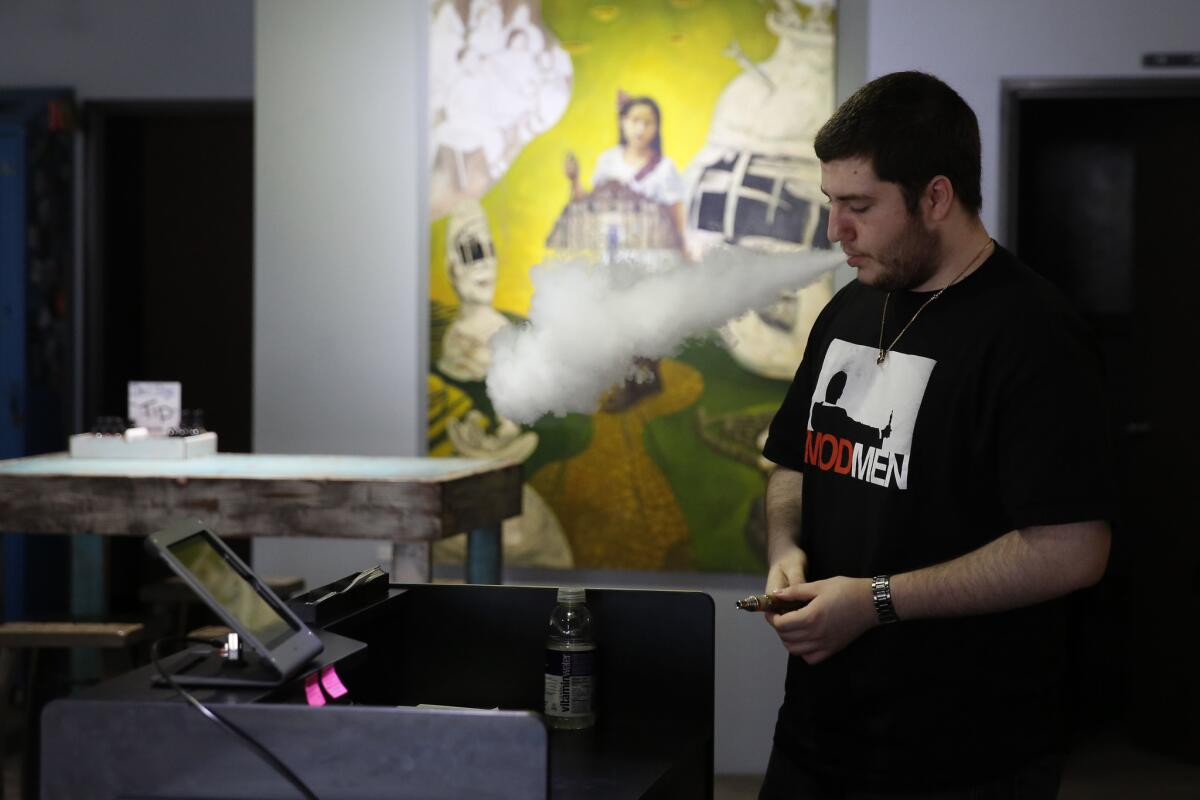Bills on smoking still haven’t been sent to the governor as tobacco politics play out

Reese Flores, owner, smokes an e-cigarette at Vapegoat in Highland Park last year.
- Share via
Reporting from Sacramento — Two weeks after approving a package of anti-smoking bills, the state Legislature has yet to send them to the governor for final action and may not do so until mid-April. The delay could hinder a referendum threatened by the tobacco industry to overturn the measures.
The bills opposed by the tobacco industry would, among other things, raise the smoking age from 18 to 21 and restrict public use of electronic cigarettes.
Keeping the bills from the governor’s desk for a month would hold up the start of a referendum drive to overturn the measures in the event that Gov. Jerry Brown signs them.
That could help four initiatives backed by prominent Democrats that are in the signature-gathering stages and expected to be off the streets by the end of April.
The initiatives would raise the state tobacco tax by $2 a pack; legalize recreational use of marijuana; extend 2012’s Proposition 30 on income tax rates to fund education; and enact Brown’s plan to overhaul the criminal justice system.
The political maneuvers began after a tobacco industry lobbyist warned a legislative staffer in a March 2 email that the initiatives to raise the tobacco tax and extend Proposition 30 could be endangered by a referendum to overturn legislation raising the smoking age.
In the email obtained by the Los Angeles Times, lobbyist George Miller IV indicated that the tobacco industry would pay a premium for signature gatherers on its referendum, depriving other ballot drives of the resources they need.
“When we hit the street with a referendum paying $10 per signature, Prop. 30 is dead as well as $2 a pack tax,” Miller wrote. “We will have every signature gatherer on an exclusive. Just letting you know so you can’t say you were not warned.”
Calls to Miller from The Times were not returned, and an official for Altria, the parent company of cigarette maker Philip Morris USA, declined to comment. The warning was condemned by Dustin Corcoran, chief executive for the California Medical Assn., which supports raising the smoking age.
“It should come as no surprise that an industry that targets kids for deadly, lifelong addiction would threaten to undermine their education and healthcare, too,” Corcoran said.
The tobacco industry cannot begin a referendum drive until Brown signs the bills into law. Brown has not said what he will do, but delaying the arrival of the bills on his desk could mean the governor won’t act until the end of April.
By then, signature gathering for the tobacco tax, marijuana and Proposition 30 extension initiatives will be all but over, supporters say.
Most bills are processed and sent to the governor within days of legislative approval, but the tobacco bills remain in the clerks’ offices of the Senate and Assembly.
The bills raising the smoking age and restricting e-cigarettes are not likely to be sent to the governor until the second week of April, officials said.
A spokeswoman for Senate President Pro Tem Kevin De León (D-Los Angeles) said the bills are not being stalled to hinder a referendum and help the initiatives currently gathering signatures.
“The tobacco bills have complex, double-jointing language that is being reviewed by the desk staff in the usual enrolling and engrossing process,” Claire Conlon said.
Cynthia Cabrera, president of the Smoke-Free Alternatives Trade Assn., which represents the e-cigarette industry, says she fears the delay could deprive citizens of their right to raise grievances if it makes it harder to qualify a referendum.
“It is undermining the democratic process because it is shutting off the ability to redress a wrong that consumers might see,” she said.
Cabrera said there is a “strong possibility” her group would seek a referendum on the e-cigarette bill, “assuming we were able to pull it off.’’
Any referendum drive would have to collect the signatures of 365,880 registered voters in 90 days to qualify for the Nov. 9 ballot.
The stalling tactic is legal but may seem suspicious to average citizens, said Dan Schnur, director of the Jesse M. Unruh Institute of Politics at USC.
“There is no law against this kind of legislative slow jamming right now but perhaps there should be,” Schnur said. “Voters have a reasonable expectation that when a bill passes, something will actually happen.”
Follow @mcgreevy99 on Twitter
ALSO:
Prosecutors oppose Newsom’s gun control initiative
Brown asks for help on his parole ballot initiative
Updates on California politics
More to Read
Get the L.A. Times Politics newsletter
Deeply reported insights into legislation, politics and policy from Sacramento, Washington and beyond. In your inbox three times per week.
You may occasionally receive promotional content from the Los Angeles Times.











